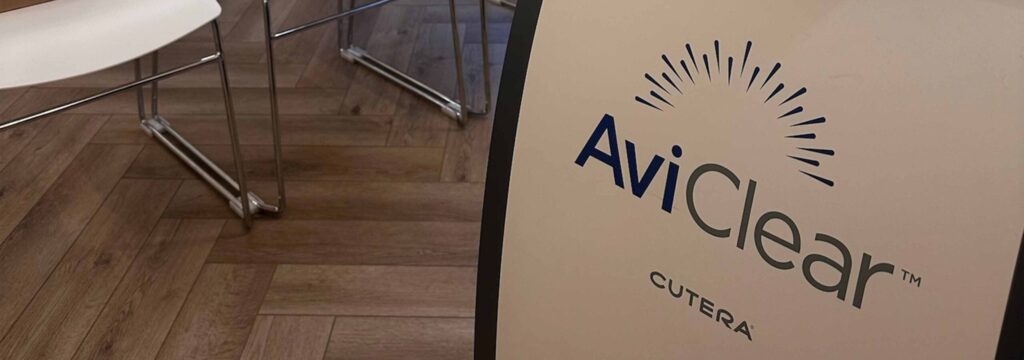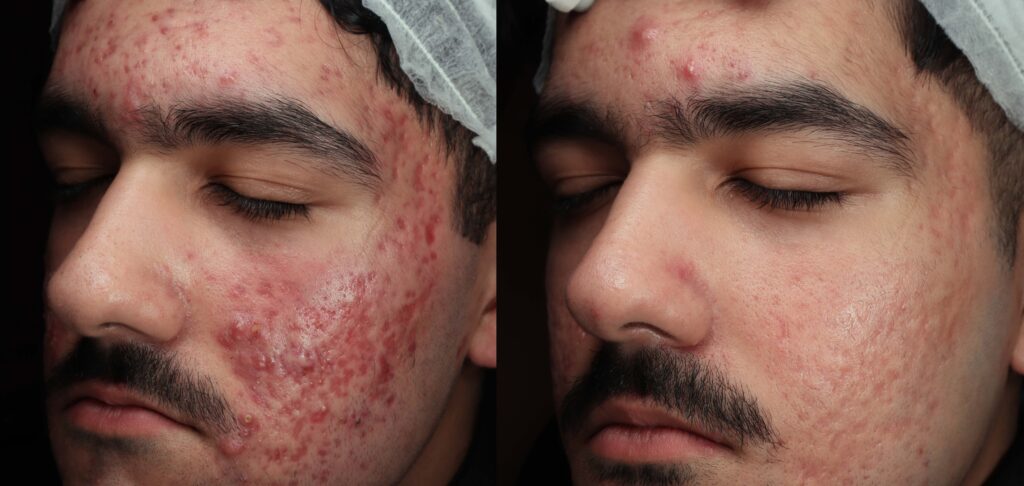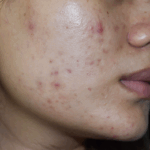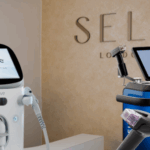
AviClear vs Accutane: Which Acne Treatment Is Right for You? Explained by London Dermatologist, Dr Anjali Mahto
For decades, isotretinoin, commonly known by its original brand name, Roaccutane or Accutane, has been considered the gold standard for treating severe or resistant acne. It is a powerful systemic medication with the ability to induce long-term remission, often after just one course. But it is also a drug that carries significant baggage: strict regulations, side effects, stigma, and in some cases, genuine fear. For many patients, the thought of taking Accutane feels like a last resort.
Now, there is another option.
AviClear is the first and only laser specifically designed to treat acne by targeting the sebaceous glands. It does not require blood tests, prescriptions, or contraception. It is not a medication. It is a non-invasive, device-based treatment that offers a different pathway, and for some patients, a more acceptable one.
At Self London, we treat acne every day. We offer both isotretinoin and AviClear. This is not a piece written to sell one or discredit the other. Instead, it is an honest, consultant-led comparison designed to help patients understand the key differences, benefits, and limitations of each treatment and how to decide what is right for their skin. Both options have a role and patients deserve an informed choice not fear-mongering.
What is Accutane, and how does it work?
Isotretinoin is a synthetic derivative of vitamin A. It works by reducing the size and activity of sebaceous glands, decreasing sebum production, and normalising skin cell turnover. It also has anti-inflammatory effects. Taken orally, usually over a period of four to six months, it delivers systemic change that impacts the skin from within.
It is a treatment that can potentially induce remission in severe, scarring acne. In many cases, a single course is enough to clear the skin for years, although relapse and acne recurrence is recognised. It is prescribed under strict guidelines and requires regular blood monitoring and contraception protocols, especially in women of childbearing age due to its teratogenicity.
What is AviClear, and how does it work?
AviClear is a 1726 nanometre laser that selectively targets the sebaceous glands using light-based energy. It delivers controlled thermal damage to the oil-producing structures in the skin, reducing sebum output over time. This leads to fewer blocked pores, less inflammation, and fewer breakouts.

It is not systemic. It is not a medication. It is performed in-clinic as a course of three sessions spaced four weeks apart, with gradual improvement over the following months. AviClear does not require blood tests, does not affect internal organs, and does not carry the same risk profile.
At Self London, we have treated the largest number of AviClear patients in the UK and have developed a clear understanding of how results unfold over time. In some patients, oil reduction begins within weeks. In others, it takes several months. But the end result, clearer skin with less oil, is often similar in direction to isotretinoin, achieved without tablets or systemic exposure.
Comparing mechanisms: internal drug vs targeted laser
Accutane works systemically. It affects all sebaceous glands in the body. This is why it is so effective, but also why it causes side effects such as dry lips, dry eyes, and joint pain. It alters your physiology while you take it.
AviClear works locally. It affects only the areas treated with the laser. It does not dry out your eyes or lips, does not alter liver enzymes, and does not require changes to your diet or supplementation.
For patients with acne confined to the face, particularly those with U-zone acne or oil-driven breakouts, this localised approach is often sufficient. For patients with widespread acne involving the chest, back, and shoulders, isotretinoin may be more appropriate.
Safety and side effects: a different risk profile
Isotretinoin is a regulated medicine. In the UK, it can only be prescribed by consultant dermatologists or equivalent specialists. It carries known risks, including:
- Teratogenicity (serious risk to unborn babies)
- Mood disturbance or low mood in a minority of patients
- Dry skin and mucous membranes
- Sun sensitivity
- Elevated liver enzymes or lipids
- Muscle and joint aches
- Risk of flare-up during initiation
These risks are manageable, but they are real. They require monitoring and discussion. For some patients, they are unacceptable.
AviClear, by contrast, has a favourable safety profile. The most common side effects are:
- Mild discomfort during treatment
- Transient post-treatment redness lasting from a few minutes to a couple of hours
- Occasional flare-up of acne after session one or two
We have not seen pigmentary changes, scarring, or any serious adverse events in our AviClear cohort to date. The treatment is suitable for all skin types and does not require medical downtime.
Hormonal acne: can either of them help?
Hormonal acne is not a formal diagnosis, but it is a common clinical pattern, often involving breakouts along the jawline, chin, and lower cheeks, particularly in adult women. It may worsen pre-menstrually and often resists topical treatment.
Isotretinoin works well in hormonal acne, but relapse is more common. Women with hormonally influenced skin often need a higher cumulative dose or longer course to achieve remission. It is also worth noting that some women prefer to avoid oral retinoids if they are planning pregnancy in the near future.
AviClear can be highly effective in this group, especially when oiliness is a dominant feature. In our practice, we have seen excellent responses in women with persistent U-zone acne, many of whom had already completed isotretinoin in the past and were experiencing recurrence. AviClear allows for tailored energy application in specific areas, offering a targeted option for hormonal flares without affecting fertility or systemic health.
Downtime and disruption: what does the treatment journey look like?
A typical isotretinoin course involves six months of daily medication, monthly reviews, and regular blood tests. Patients must avoid waxing, cosmetic procedures, and usually need to alter their skincare routine completely. Many report peeling lips, dry nasal passages, sensitivity to sunlight, and challenges with makeup or contact lenses.
AviClear, by contrast, requires three clinic sessions with minimal post-treatment care. Most patients return to work or social activity the same day. There is no peeling, no bruising, and no restriction on skin treatments in the weeks that follow. This makes AviClear a more lifestyle-compatible treatment for professionals, parents, students, or those unable to take time off or commit to regular blood testing.
Cost comparison: upfront vs subsidised care
One of the few advantages of isotretinoin is that it is often available through the NHS for qualifying patients. In private practice, a full course (including consultations and monitoring) typically ranges from £1,500 to £2,500.
AviClear is not currently available on the NHS and must be paid for privately. A full course at a reputable clinic usually costs between £3500 to £4500 depending on provider background and expertise and location. While the cost may seem higher, it is important to consider the difference in safety monitoring, follow-up requirements, and lifestyle interference.
What about cost? Why is AviClear more expensive at Self London?
If you are comparing AviClear pricing across clinics, you will notice that our treatment course costs more. We are not offering AviClear as a marketing add-on. We are not using it as a way to upsell skincare, chemical peels, other adjuvant lasers or filler. We are a consultant dermatologist-led clinic with a specialist and legacy focus on acne and acne scarring; our clinic founder is a recognised acne-specialist. Self London was the first consultant dermatology clinic in Europe to adopt AviClear as a serious treatment pathway.
At Self London, you are not simply booking three sessions of laser. You are receiving acne care from the UK’s most experienced AviClear team. Our protocols are based on real patient data, refined through clinical audit, and delivered under medical supervision. Every treatment includes full consultation, VISIA imaging, tracking over time, and critically, the ability to interpret what is happening beneath the skin.
Could you book AviClear elsewhere for less? Possibly. But cheaper treatment is not always better treatment. In a device like this, clinical judgement, combination treatments, hormonal screening where needed, and protocol quality matter more than the machine itself.
We treat patients who have tried everything, antibiotics, skincare plans, failed prescriptions. Many come to us having wasted money on poor advice. Our goal is not to offer the cheapest acne treatment. Our goal is to offer the one that works, with honesty, strategy, and long-term thinking. If you are serious about treating your acne, you deserve to be treated by people who are serious about acne. Your outcomes are our outcomes; we both want these to be good.

Sustainability of results: is one more permanent than the other?
Isotretinoin offers the possibility of remission. For many, acne does not return, or returns in a milder, more manageable form. But relapse is not uncommon, particularly in hormonal cases, polycystic ovary syndrome, or patients with high baseline oil production. Multiple courses of the drug may be required.
AviClear is designed to create a durable reduction in oil production. It is not as aggressive as isotretinoin in suppressing sebaceous gland activity, but the results can still be long-lasting. At Self London, we have followed patients for over 12 months post-treatment with continued improvement and no systemic interventions.
Where AviClear excels is in the ability to offer additional sessions or future top-ups without reintroducing medication. This flexibility is valuable in managing relapses or future flare-ups without re-entering the medical pathway.
Can you combine AviClear and Accutane?
In theory, yes we can. We have experience of combining isotretioin with AviClear at the clinic. We use combination in-house protocols depending on clinical need which will be discussed at consultation.
We have also treated multiple patients at Self London who had been on isotretinoin previously but were not keen to repeat the experience. In many cases, AviClear provided significant improvement with far less disruption and no systemic side effects.
Which one is right for you?
There is no single answer. Both treatments have their place. Both are supported by evidence. Both can deliver exceptional outcomes when used appropriately.
You may be better suited to isotretinoin if:
- Your acne is widespread (including back and chest)
- You have severe nodulocystic acne with scarring
- You are medically suitable and open to systemic treatment
- You have already tried topical and oral antibiotics with limited success
You may be better suited to AviClear if:
- You have mild, moderate to severe acne confined to the face
- You are oil-rich with a pattern of persistent breakouts
- You are unwilling or unable to take isotretinoin
- You prefer a non-drug, non-invasive option with minimal downtime
At Self London, we offer both pathways and more. Acne is not a one-size-fits-all condition, and treatment should never be dictated by trends, social media, or marketing. Instead, we start with a detailed dermatology consultation, VISIA imaging, and clinical photography. We assess the type of acne, the contributing factors, and the patient’s preferences, history, and goals. From there, we build a plan that makes sense.
Final thoughts
The decision between AviClear and isotretinoin is not about which treatment is better. It is about which is better for you, at this moment, with your skin, your health, and your lifestyle. At Self London, we are proud to offer patients options. Real options. Not gimmicks. Not generic skincare packages. We stand for consultant-led acne care rooted in clinical expertise and real data, not fear-mongering.
If you are considering AviClear, isotretinoin, or simply want an honest opinion on what might work best for your skin, we are here to help.





